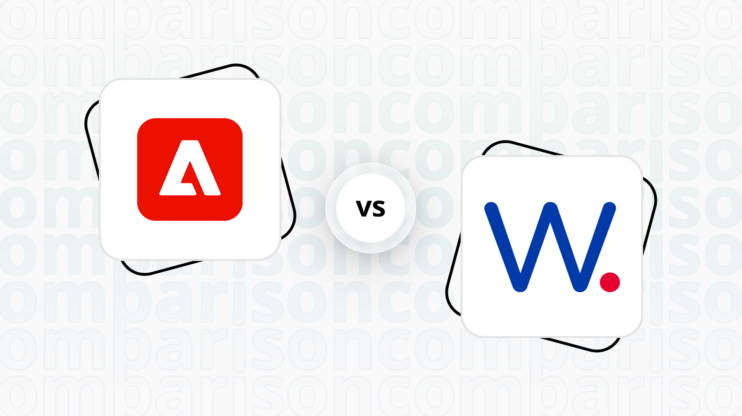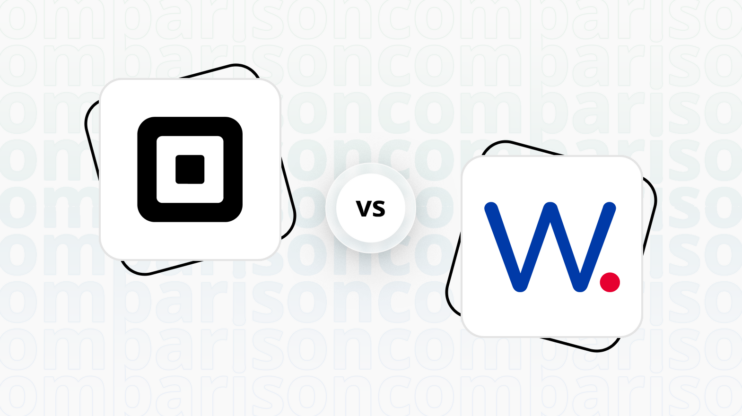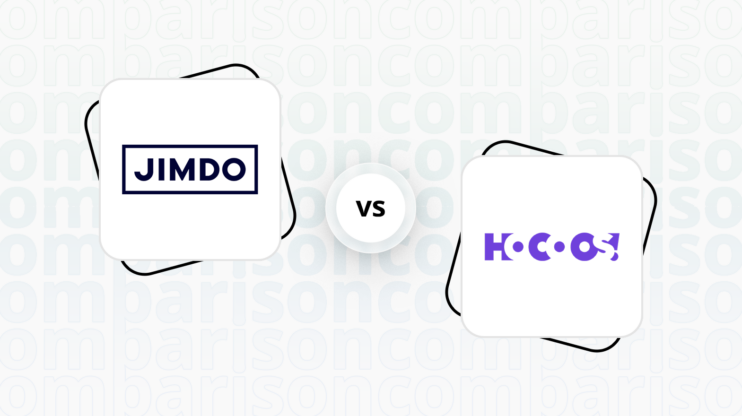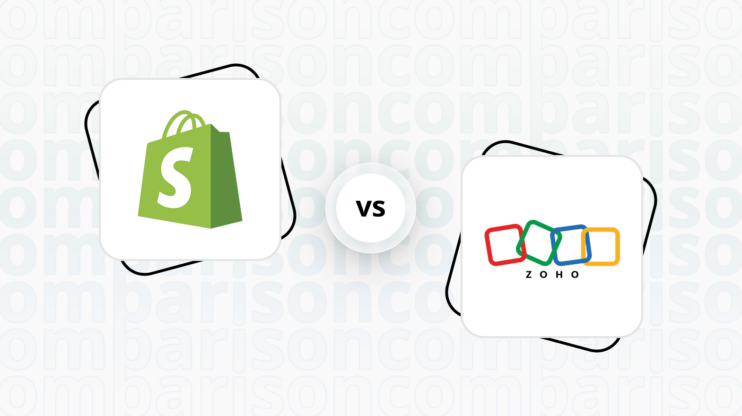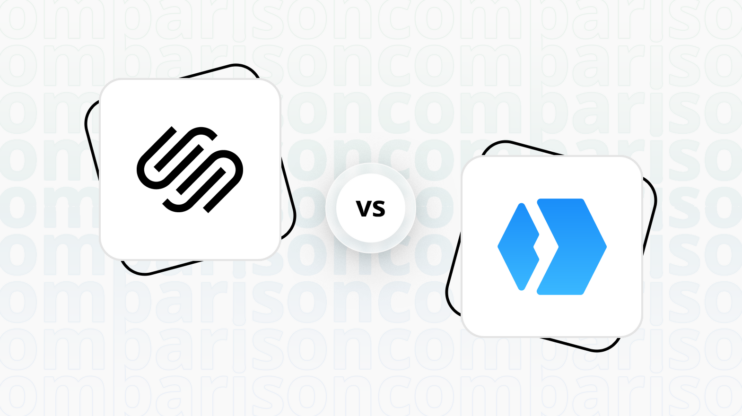Final verdict
Shopify and Hocoos both offer unique features, but they cater to different user needs and preferences.
-
Shopify (Overall Grade: 8.1/10)
is a robust ecommerce platform designed for businesses looking to scale. It excels in providing comprehensive ecommerce tools, advanced marketing features, and strong security measures. Shopify’s extensive app store and superior customer support make it an ideal choice for serious online stores. When comparing Shopify vs Hocoos, Shopify stands out for its specialized ecommerce capabilities and professional design functionalities. -
Hocoos (Overall Grade: 5.6/10)
is a user-friendly website builder that leverages AI to simplify the website creation process. It is perfect for individuals and small businesses looking for an easy-to-use platform with customizable templates and basic ecommerce features. Considering Shopify vs Hocoos, Hocoos offers a more affordable option with a free plan and a focus on ease of use, making it suitable for users with no coding or design experience.

|

|
|
|---|---|---|
|
Design functionalities & templates |
8.2 |
7.2 |
|
Ease of use |
7.5 |
8.1 |
|
Ecommerce |
9.2 |
7.4 |
|
Website Editors |
7.9 |
7.7 |
|
Product testing options |
8.1 |
7.5 |
|
Price |
8.2 |
7.8 |
|
Hosting quality |
9.0 |
2.4 |
|
Website speed optimization |
7.8 |
6.2 |
|
Plugins and integrations |
8.7 |
6.3 |
|
Marketing features |
8.8 |
7.0 |
|
Customer support |
8.6 |
3.0 |
|
Security |
9.0 |
4.5 |
|
AI capabilities |
7.9 |
7.3 |
|
User Management |
6.5 |
0.0 |
Best for ecommerce
 9.2
9.2
 7.4
7.4
Verdict
: Shopify is the superior choice for robust and scalable ecommerce solutions, while Hocoos is better suited for simpler, AI-driven website setups.
-
Shopify
: With a score of 9.2, Shopify excels in providing a comprehensive set of ecommerce features. It offers advanced tools for product management, payment processing, and order fulfillment, making it ideal for businesses looking to scale. Shopify’s extensive library of apps and integrations further enhances its ecommerce capabilities, making it a top choice for serious online businesses. -
Hocoos
: Scoring 7.4, Hocoos is a user-friendly platform that leverages AI to create customized websites quickly. It offers essential ecommerce features like product management, payment processing, and SEO optimization. However, it lacks the depth and scalability of Shopify, making it more suitable for simpler ecommerce setups and users who prefer a quick, AI-driven website creation process.
Best for informational & business websites
 6.8
6.8
 7.4
7.4
Verdict
: When it comes to creating informational business websites, Hocoos has a slight edge over Shopify due to its user-friendly interface and AI-driven customization. However, Shopify remains a strong contender with its robust features and professional templates.
-
Shopify
: Shopify is primarily an ecommerce platform, but it can also be used for informational websites. Its professional templates and robust features make it a good choice for businesses that may want to expand into ecommerce in the future. However, its focus on ecommerce means it has a steeper learning curve for those looking to create simple informational sites. Shopify scores 6.8 in this category. -
Hocoos
: Hocoos excels in creating informational business websites with its AI-driven customization and user-friendly interface. It allows users to create professional-looking websites without any coding or technical expertise. The platform’s ease of use and customizable templates make it ideal for businesses looking to establish an online presence quickly and efficiently. Hocoos scores 7.4 in this category.
Detailed comparison
Design functionalities & templates
Design FunctionalitiesRepresents how well each platform allows for creative design and customization of websites.Score Components:
- Template Variety (30%): Range and quality of design templates.
- Customization (30%): Flexibility and options for design alterations.
- User Interface (20%): Ease and intuitiveness of the design process.
- Responsiveness (10%): Adaptability to different devices and screen sizes.
- Innovation (10%): Unique design features and tools.
 8.2
8.2
 7.2
7.2
🏆
Winner: Shopify.
If you’re looking for a platform that offers a range of professional templates and design functionalities, Shopify is the preferred choice.
Shopify’s templates are sleek and professional, ideal for ecommerce sites. They offer a sophisticated look with a focus on online stores. While the free template selection is not large, Shopify’s premium theme store provides a variety of industry-specific options, offering advanced features for a strong brand presence.
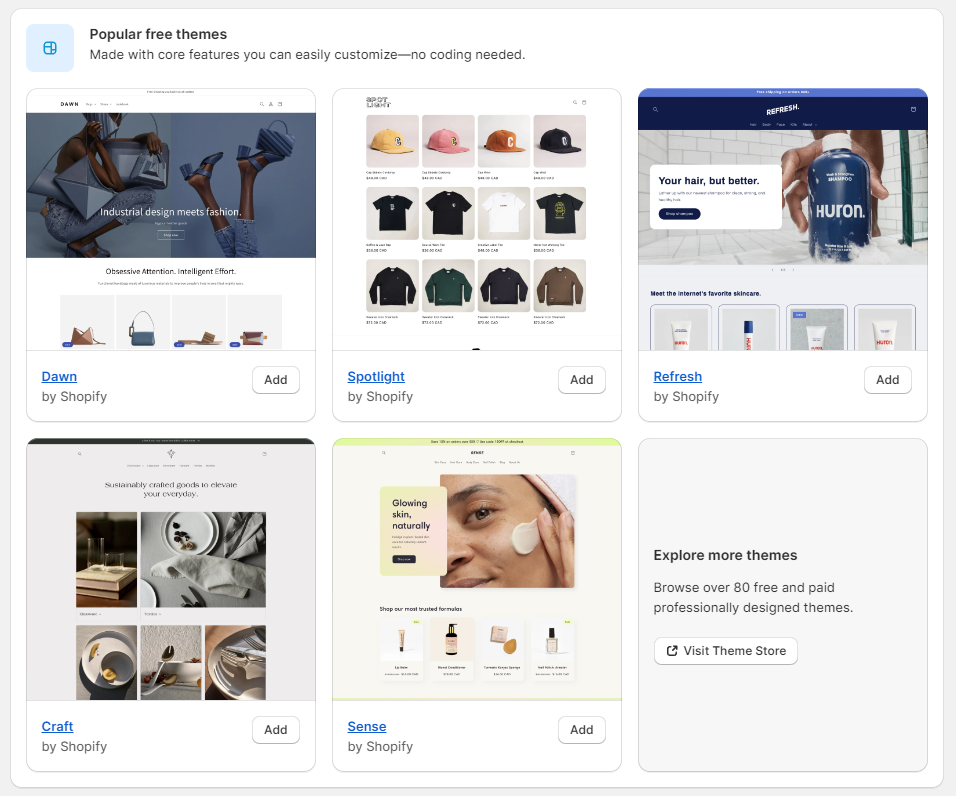
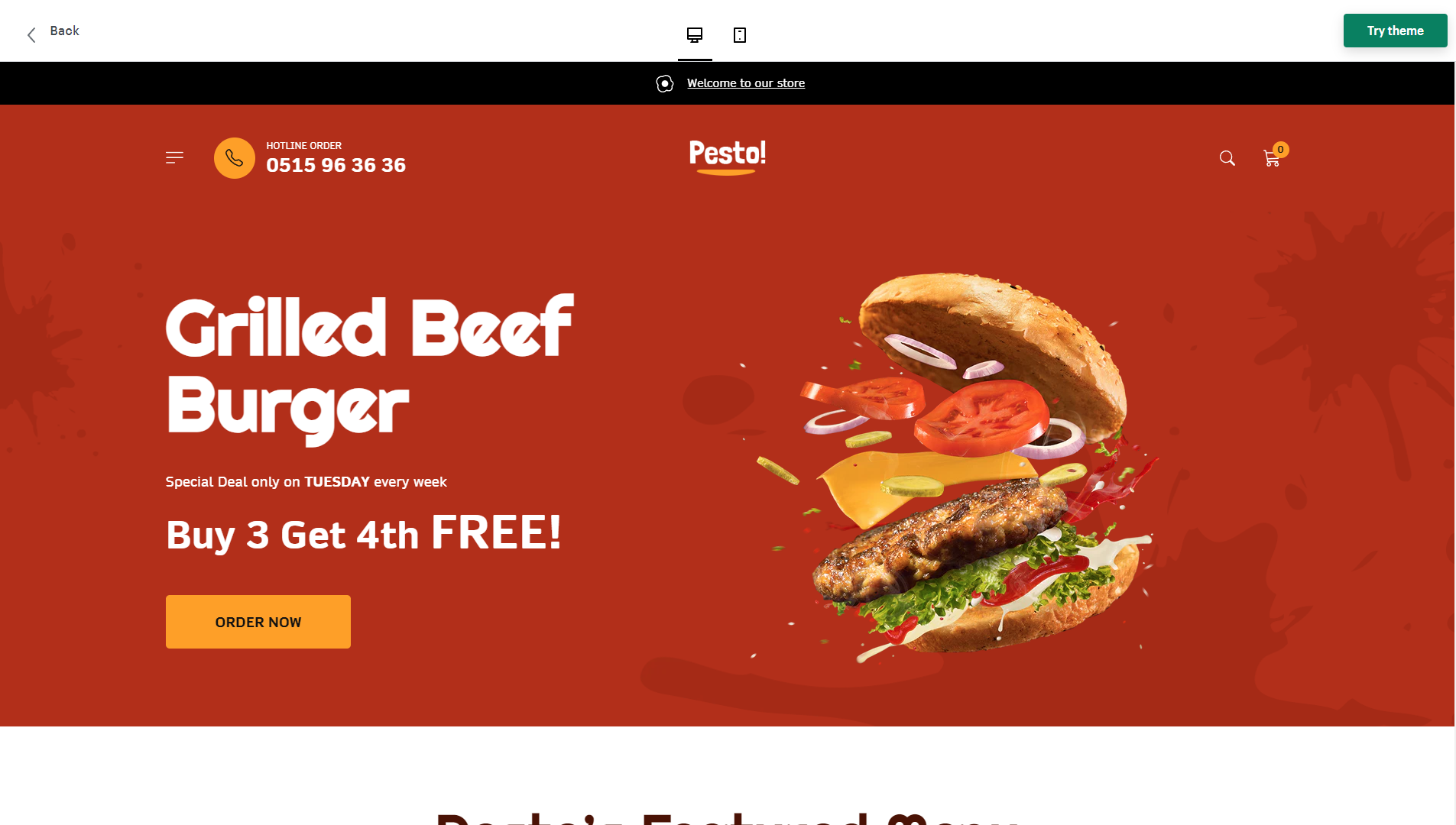
Compared to Shopify, Hocoos offers a unique approach to creating websites. Instead of using pre-designed templates, Hocoos uses AI to understand your requirements and design preferences based on a simple questionnaire. This approach allows for the creation of customized websites without the need for manual editing or starting from a predetermined template. However, Hocoos does not provide a link to their themes page or any screenshots of their templates.
Get a head start on website creation with AI
Create a custom website tailored to your business needs 10X faster with 10Web AI Website Builder!
Ease of use
Ease of useReflects the platform’s overall user-friendliness.Score
Components:
- Learning curve (40%): Quickness and ease of getting started.
- Interface design (30%): Simplicity and intuitiveness of layout.
- User guidance (20%): Quality of tutorials and support.
- Flexibility (10%): Adaptability to various user skills.
 7.5
7.5
 8.1
8.1
🏆 Winner: Hocoos
. Scoring 8.1, Hocoos is recognized for its ease of use, catering to users with no coding or design experience, facilitating the effortless creation and customization of websites. Shopify, with a score of 7.5, offers a robust platform but with a steeper learning curve, especially for those new to ecommerce. If ease of use is a priority, Hocoos is the clear winner in this category.
Learning Resources
🏆 Winner: Shopify
. While Hocoos lacks in traditional learning resources, Shopify provides an extensive library of articles, tutorials, webinars, and video courses, focusing primarily on setting up and managing online stores. This makes it easier for users to learn and adapt.
For ecommerce
EcommerceMeasures the platform’s effectiveness in supporting online business activities.Score Components:
- Ecommerce themes and templates (20%): Variety and design of templates.
- Product management (25%): Ease of managing and organizing products.
- Payment options (25%): Variety and convenience of payment methods.
- Ecommerce features (20%): Features for managing an ecommerce store.
- Integration (10%): Compatibility with external e-commerce tools and services.
 9.2
9.2
 7.4
7.4
Shopify, with a score of 9.2, is a leading ecommerce platform that provides a comprehensive set of features for online businesses. It offers tools for creating and customizing online stores, managing products, processing payments, and handling order fulfillment. On the other hand, Hocoos, scoring 7.4, offers ecommerce features that allow users to set up online stores, including online payment systems, product pages, and promotions such as discounts and coupons.

|

|
|
|---|---|---|
|
Ecommerce themes and templates |
8.2 |
6.0 |
|
Product page customization |
8.5 |
7.0 |
|
Payment processing and commissions |
8.8 |
6.5 |
|
POS capabilities |
8.1 |
5.5 |
|
Payment gateways |
9.5 |
7.0 |
|
Product numbers |
9.0 |
6.5 |
|
Additional ecommerce features |
9.1 |
7.0 |
Shopify ecommerce features:
- Comprehensive store builder
- Shopify Payments and other gateways
- Advanced inventory management
- Multi-channel selling
- Abandoned cart recovery
- Detailed analytics and reporting
Hocoos ecommerce features:
- Product management
- Order management
- Payment processing
- Shipping and Logistics
- Marketing and SEO
- Analytics and reporting
- Customizability and Integrations
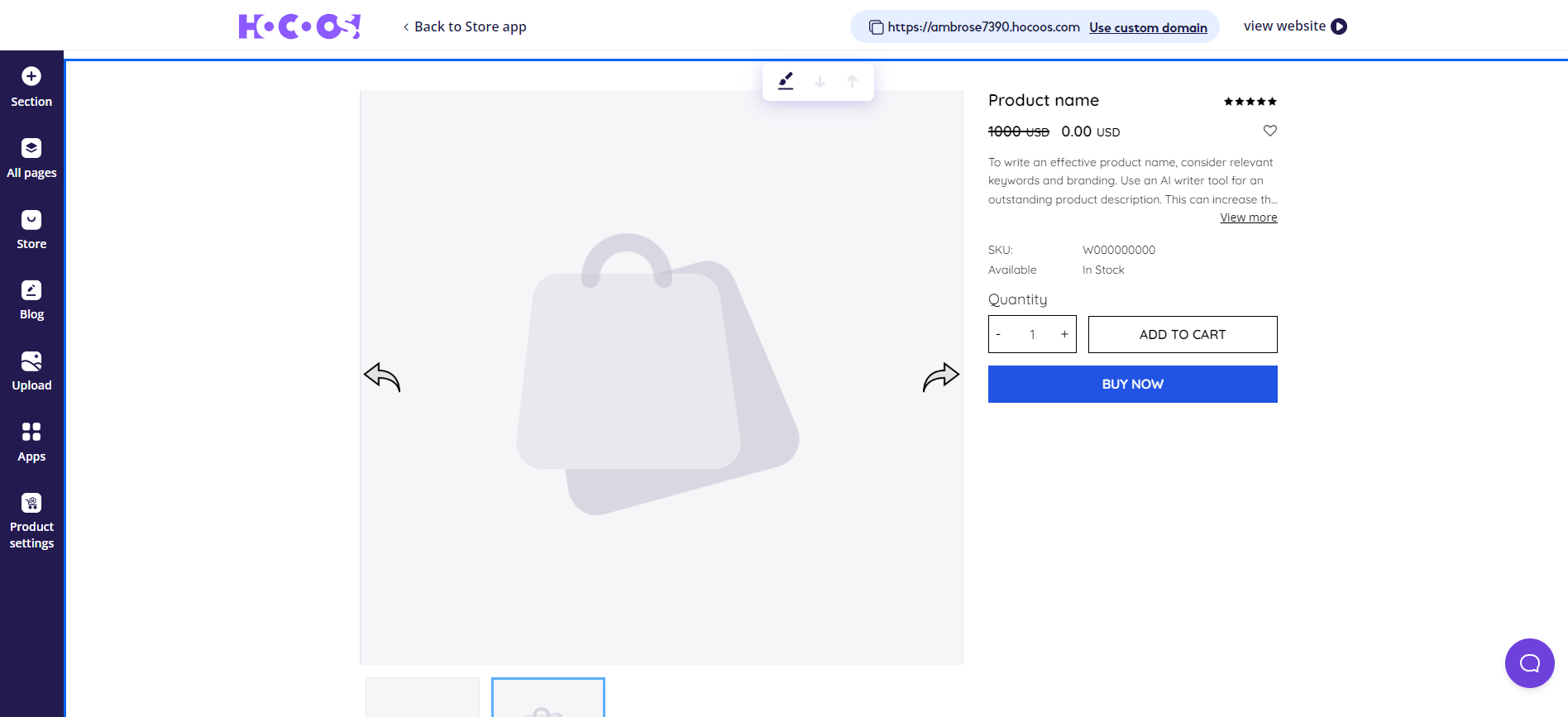
Ecommerce themes & templates
Shopify offers about 150 modern responsive themes for creating a virtual storefront, ensuring a good look on both desktop and mobile devices. While some themes are free, others cost between $170 to $380. In contrast, Hocoos does not rely on traditional templates for website creation, including ecommerce sites. Instead, it utilizes AI technology to generate unique and customized websites based on the user’s specific inputs.
Product page customization
Shopify has a limit of three options per product, totaling 100 unique variations. This limit may not pose a significant constraint, and it is suggested that for products with numerous options, creating separate listings on Shopify can be a more manageable approach. While Shopify offers titles, descriptions, and image galleries with zoom effects, customization options like adding ribbons, size charts, and wishlists are not as straightforward. However, Shopify distinguishes itself with additional features through its extensive library of extra apps, offering functionalities like reviews, Facebook stores, eBay item importers, and a unique Augmented Reality feature for an enhanced customer experience.
On the other hand, Hocoos enables the creation and editing of professional-looking product pages, tailored to enhance the appeal of your products to your target audience, ultimately aiming to boost sales. Additionally, Hocoos allows for easy setup of product variations, including different sizes, colors, or attributes, empowering you to customize offerings, manage pricing, and ensure availability for each variation.
Payment processing
When it comes to payment processing, Shopify offers payments with typical charges of
2.9% + 30¢
per online transaction on basic plans, and lower fees for higher-tier plans. However, it adds extra fees for using other payment gateways. Shopify Payments is Shopify’s own payment processing gateway. It allows merchants to accept credit card payments directly on their store without having to integrate third-party payment providers. This simplifies the payment process, reduces transaction fees, and streamlines the handling of finances.
Hocoos, on the other hand, simplifies website creation through AI-driven features, offering customizable websites tailored to user preferences. Its platform allows quick website setup by answering a few questions, catering to various business needs such as blogs, online stores, and bookings. Users can personalize their websites using a user-friendly editor for layout, colors, and content. Additionally, Hocoos facilitates online presence with hosting services and integrates payment methods like PayPal and Stripe for seamless management of transactions and inventory.
Website Editors
Website EditorsEvaluates the platforms’ website building and editing capabilities.Score Components:
- Customization tools (40%): Range and power of editing features.
- Editor usability (30%): User experience within the editor.
- Design flexibility (20%): Freedom in layout and design changes.
- Update and maintenance ease (10%): Simplicity of updating and maintaining the site.
 7.9
7.9
 7.7
7.7
🏆
Winner: Shopify
. Shopify, with a score of 7.9, excels in providing a streamlined, ecommerce-focused editing experience. It’s particularly beneficial for users who prioritize efficient management of online stores. The editor is straightforward, making it easy to add products, manage inventory, and set up payment methods. Shopify’s editor is optimized for sales and business growth, with built-in tools specifically designed for ecommerce businesses.
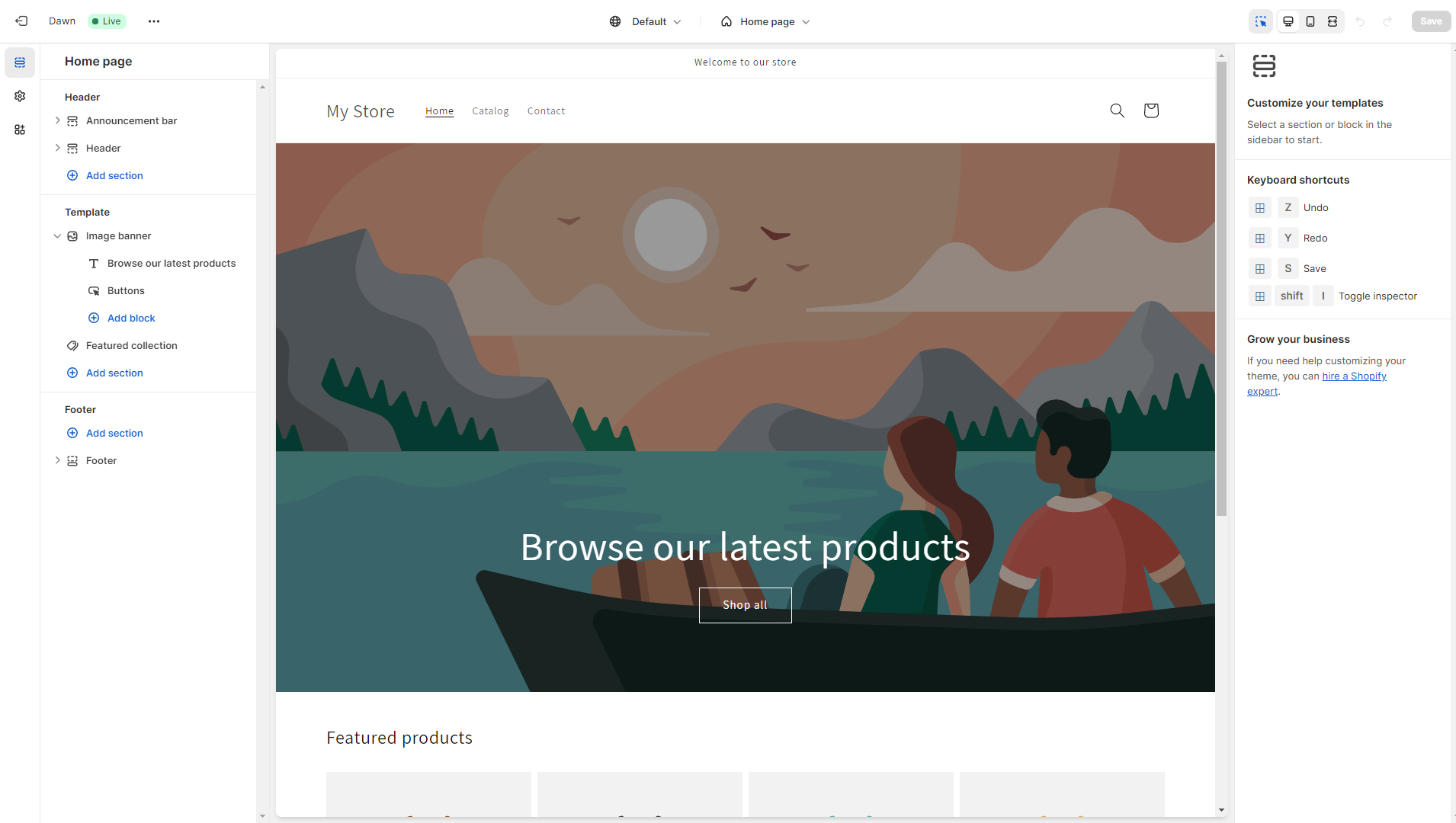
Hocoos’s editor, scoring 7.7, is an AI-driven website builder that simplifies the creation of personalized websites. This platform utilizes advanced AI algorithms to automatically generate a custom website tailored to the user’s business needs, including design, content, and images. It features an easy-to-use editor for further customization and offers AI-powered tools for content creation, logo design, and more.
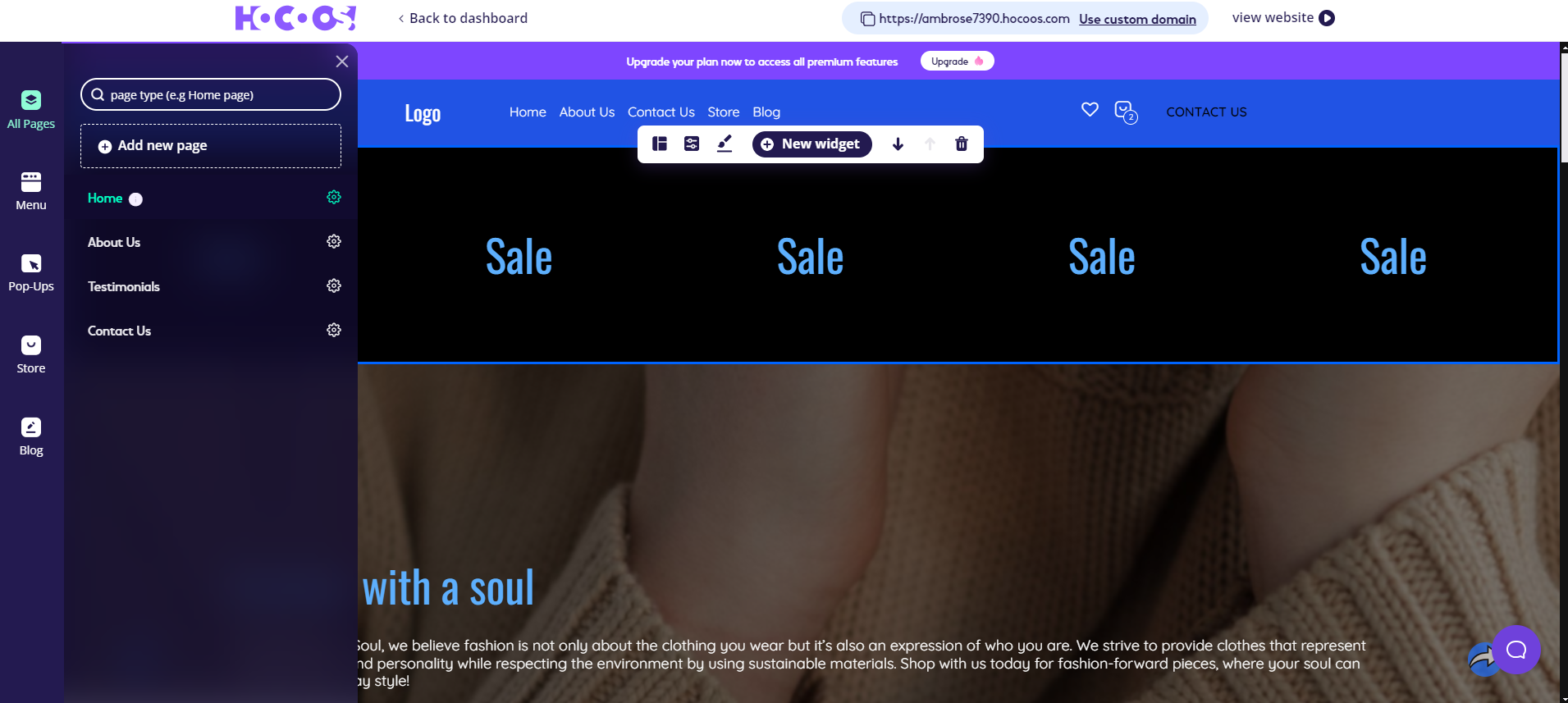
Mobile editor/app
 8.0
8.0
 0
0
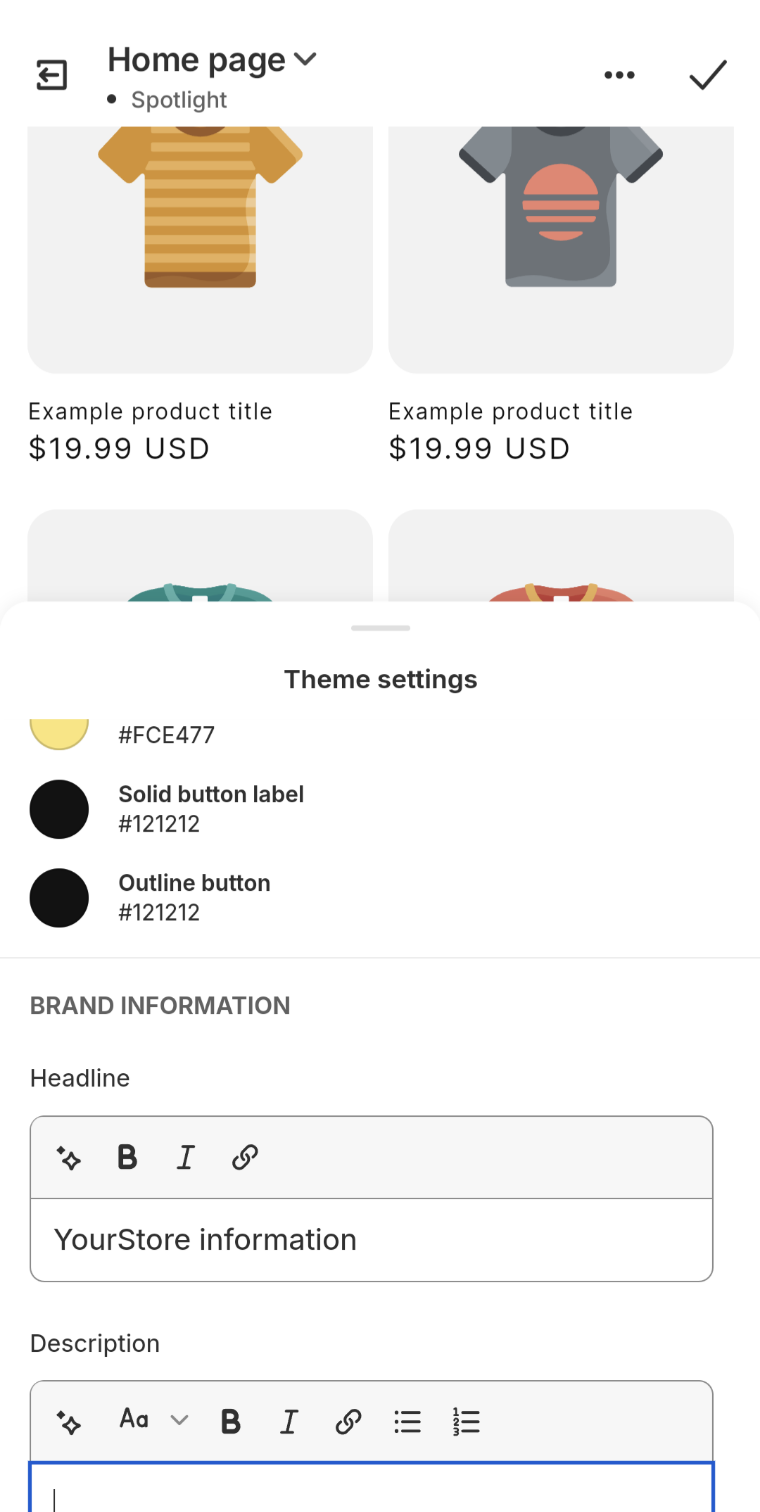
🏆
Winner: Shopify
. Shopify offers a mobile app that allows users to manage their online store from their mobile device. This feature enables the addition, removal, editing, and rearrangement of content on the store’s website, offering convenient on-the-go adjustments to the store’s appearance and layout.
On the other hand, Hocoos does not have a dedicated mobile app for editing or managing the website. Therefore, in terms of mobile editing capabilities, Shopify is the clear winner.
Product testing options
Product Testing OptionsAssesses the options for trying out platform features before commitment.Score Components:
- Trial quality (40%): Extent and usefulness of the trial or free version.
- Feature accessibility (30%): How many features are available to test.
- Trial duration (20%): Length of the trial period.
- Ease of transition (10%): Smoothness of moving from trial to paid plans.
 8.1
8.1
 7.5
7.5
Overall Result
:
Shopify wins
. Shopify scores 8.1, offering a 14-day free trial with access to all features, while Hocoos scores 7.5, offering a free version with limited feature testing. Both platforms offer a 14-day money-back guarantee.

|

|
|
|---|---|---|
|
Free Plan |
No (14-day free trial) |
Yes |
|
Trial Duration |
14 days | No trial version |
|
Testing Premium Features |
All features during free trial |
Some features can be tested with free plan |
Price
PriceLooks at the cost-effectiveness and value for money of each platform.Score Components:
- Plan value (40%): What each pricing tier offers.
- Transparency and clarity (30%): Clearness of pricing structures.
- Flexibility of plans (20%): Range of options to suit different budgets.
- Hidden costs (10%): Additional expenses not included in the plan.
 8.2
8.2
 7.8
7.8
Shopify offers more comprehensive ecommerce features at a higher price, while Hocoos offers a more affordable option with a free plan and a cheaper premium plan. However, Hocoos does not offer an enterprise plan.

|

|
|
|---|---|---|
|
Free |
No offering at this amount. |
Free ($0/month): Limited features, ideal for personal projects or trying out the platform. Includes free website hosting, a limited booking system, a blog (without AI blogging), 15 image uploads, and 20 uses of AI content generation. |
|
$15-$30 |
Shopify Basic ($29/month): Unlimited products, 2.9% + 30¢ card fee with Shopify payments, Extra 2% gateway fee without Shopify Payments, Abandoned cart recovery, Automated sales tax, Digital products, POS Integration, 2 staff accounts. Value for price: 8.0 |
Premium ($15/month): All features, including a free custom domain name, online payments, 600,000+ stock images, marketing integrations, unlimited image uploads, unlimited AI features, a custom email address, and email marketing. Value for price: 9.0 |
|
$70-$80 |
Shopify Standard ($79/month): Lower card fees (2.6% + 30¢), Gift cards, Professional reports, 5 staff accounts. Value for price: 8.5 |
No offering at this amount. |
|
$200+ |
Advanced Shopify ($299/month): Lowest card fees (2.49% + 30¢), Advanced report builder, Real-time carrier shipping, Up to 15 staff accounts Value for price: 8.8 |
No offering at this amount. |
location. As a result in rare cases the prices displayed here can differ from the ones you see on their
websites.
Hosting quality
Hosting
qualityExamines the reliability and performance of the hosting solutions.Score Components:
- Uptime (40%): Consistency and reliability of website availability.
- Speed (30%): Loading times and performance.
- Bandwidth and storage (20%): Sufficiency of resources provided.
- Data centers (10%): Quality and distribution of hosting infrastructure.
 9.0
9.0
 2.4
2.4
Winner: Shopify
. Shopify’s hosting services are clearly superior, with a 99.99% uptime guarantee and five global data centers. Hocoos, on the other hand, lacks transparency in its hosting services, failing to provide information about its uptime, type of hosting, or data centers.

|

|
|
|---|---|---|
|
Do they offer hosting? |
Yes, included in all paid plans |
Yes, included in all paid plans, but lacks explicit details on bandwidth limitations and automatic data backups |
|
Data Centers: |
5 globally: USA (Ashburn, Virginia; Santa Clara, California), Canada (Toronto, Ontario), Ireland (Dublin), and Singapore |
Hocoos does not provide any information about its data centers |
|
Type of hosting: |
Proprietary cloud-based hosting |
Hocoos does not specify the type of hosting |
|
Uptime: |
99.99% |
Hocoos does not provide uptime statistics |
|
Uptime Guarantee: |
Yes, 99.99% |
No |
Website Speed Optimization
Website Speed OptimizationEvaluates optimization of website loading timesScore Components:
- PageSpeed Score (30%): Google’s score indicating performance optimization.
- Loading Time (30%): The average time until a website is fully interactive.
- Mobile Optimization (15%): Optimization effectiveness for mobile devices.
- Resource Optimization (15%): Optimizing images, scripts, and other heavy resources.
- CDN Usage (10%): Use of CDN to enhance speed across geolocations.
 7.8
7.8
 6.2
6.2
🏆 Winner: Shopify
Both Shopify and Hocoos place a high priority on website performance and page speed, with Shopify focusing on app efficiency and theme optimization, and Hocoos on CDN, minimization of HTTP requests, and caching. However, Shopify gets the edge when it comes to website speed optimization.

|

|
|
|---|---|---|
|
Focus |
App efficiency, Theme optimization |
CDN, Minimization of HTTP Requests, Caching |
|
Performance Tools |
Google Lighthouse, PageSpeed Insights |
Not specified |
|
Key Strategies |
App efficiency, Theme optimization |
CDN, Minimization of HTTP Requests, Caching |
|
Load Times |
Varies widely, dependent on optimization |
Varies widely, depending on optimization |
|
Page Speed Scores Range |
Scores vary; influenced by apps, images |
Varies widely, depending on optimization |
|
Core Web Vitals Improvement |
Emphasis on LCP, FID, CLS improvements |
No information available |
Shopify’s approach to enhancing site speed includes app optimization by removing unneeded app code, conditionally loading apps, avoiding immediate pop-up displays, and incorporating app functionality directly into themes. This approach leverages Shopify’s fast servers and CDN network to boost load speed. Shopify also suggests utilizing Google AMP for faster mobile page loads, although with some design compromises. Analysis of three Shopify sites showed a range of Shopify speed scores from 14 to 75, Google PSI scores from 8 to 80, and load times varying from 10.6 seconds to 2.3 seconds. Continuous maintenance and optimization are essential for keeping Shopify stores fast.
Hocoos, on the other hand, focuses on CDN, minimization of HTTP requests, and caching as its key strategies for speed optimization. However, both load times and PageSpeed scores vary widely, depending on the optimization and user’s location. There is no information available about Hocoos’ improvements in Core Web Vitals.
Get a head start on website creation with AI
Create a custom website tailored to your business needs 10X faster with 10Web AI Website Builder!
Plugins and integrations
Plugins and integrationsMeasures the range and effectiveness of additional plugins and integrations.Score Components:
- Variety of options (40%): Range of available add-ons.
- Integration smoothness (30%): Ease of integrating plugins into the site.
- Quality of plugins (20%): Functionality and reliability of the options.
- Custom integration capabilities (10%): Support for custom or third-party integrations.
 8.7
8.7
 6.3
6.3
🏆 Winner: Shopify.
With a score of 8.7, Shopify outperforms Hocoos, which has a score of 6.3. Shopify offers over 8,000 apps in its App Store, covering a wide range of functionalities. These apps come with various pricing options, including free, paid, freemium, and one-time payment models. On the other hand, Hocoos also offers a wide range of plugins and extensions to enhance the functionality of your website. However, the extensive selection and higher score of Shopify give it the upper hand in this comparison.
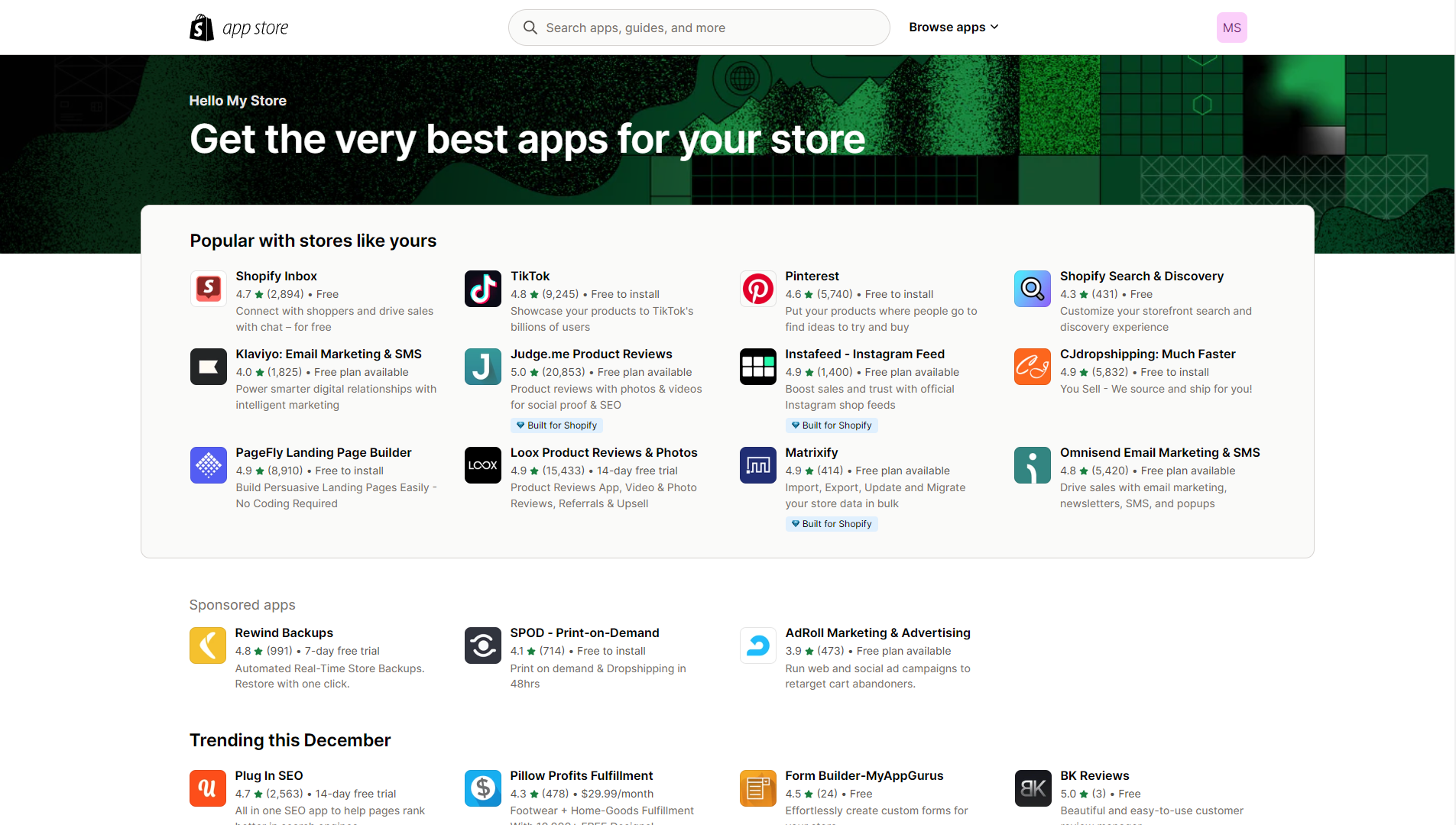
Marketing Features
Design FunctionalitiesRepresents how well each platform allows for creative design and customization of websites.Score Components:
- Template Variety (30%): Range and quality of design templates.
- Customization (30%): Flexibility and options for design alterations.
- User Interface (20%): Ease and intuitiveness of the design process.
- Responsiveness (10%): Adaptability to different devices and screen sizes.
- Innovation (10%): Unique design features and tools.
 8.8
8.8
 7.0
7.0
🏆
Overall Winner: Shopify
. Shopify stands out for its more advanced ecommerce-focused marketing tools, especially in analytics and ad campaign management. Hocoos offers a decent range of marketing features, but they are less detailed and comprehensive compared to Shopify.

|

|
|
|---|---|---|
|
SEO Tools |
|
|
|
Email Marketing |
|
(only on premium plan) |
|
Blogging |
|
|
|
Social Media Integration |
Advanced integration for selling directly on social platforms |
Basic integration with platforms like Facebook |
|
Analytics and Reporting |
Detailed analytics for in-depth insights |
Basic integration with Google Analytics |
|
Ads and Promotions |
Google Ads integration; sophisticated ad campaign management |
Basic integration with platforms like Google Ads |
Customer Support
Customer supportEvaluates the quality and availability of support options.Score Components:
- Response time (40%): Speed of support responses.
- Support quality (30%): Effectiveness and helpfulness of the support.
- Availability (20%): Range of support channels (phone, chat, email).
- Resource richness (10%): Quality of self-help and educational materials.
 8.6
8.6
 3.0
3.0
🏆 Winner: Shopify
. Comparing Shopify vs Hocoos, Shopify stands out with its 24/7 customer support available through chat, email, and phone. Shopify also offers a wealth of online resources, including tutorials, forums, and a comprehensive marketing blog, ensuring users can find the help they need at any time. For enterprise-level businesses, Shopify provides dedicated account managers, priority support, and additional resources to ensure success.
Hocoos, on the other hand, does not provide detailed information about their customer support hours and availability. While they emphasize that their support is 100% human, the lack of detailed support options and absence of enterprise support make it less robust compared to Shopify. This is reflected in their customer support score of 3.0, significantly lower than Shopify’s 8.6.
Security
SecurityLooks at the platforms’ security measures and data protection.Score Components:
- Data protection (40%): Safeguards for user and customer data.
- SSL and encryption (30%): Implementation of secure connections.
- Compliance (20%): Adherence to industry security standards.
- Regular updates (10%): Frequency of security updates and patches.
 9.0
9.0
 4.5
4.5
🏆
Winner: Shopify
. Shopify’s security measures are comprehensive and robust, with a high security score of 9.0. They prioritize data privacy and security through secure infrastructure, encryption, and limited access. Shopify complies with data privacy regulations, practices data minimization, and ensures user control and transparency. Additional security measures include two-factor authentication, regular audits, and a dedicated incident response team. Shopify also ensures website security with SSL certificates encrypting data, verifying website identity, and offering SEO benefits. Free SSL certificates are provided, with options for upgrades. The built-in Web Application Firewall filters and blocks threats, and users can add third-party firewalls for extra control and security.
On the other hand, Hocoos, with a security score of 4.5, emphasizes security for websites built with its platform, integrating advanced encryption protocols and providing regular security updates to guard against potential threats. However, Hocoos does not provide any specific information regarding the security measures they utilize for website security.
AI Capabilities
AI capabilitiesMeasures the effectiveness of AI-driven features and tools.Score Components:
- Automation efficiency (40%): Impact of AI on streamlining processes.
- Personalization (30%): AI-driven customization for users or customers.
- AI-Assisted design (20%): Role of AI in website design and functionality.
- Data analysis (10%): Use of AI in interpreting user data and analytics.
 7.9
7.9
 7.3
7.3

|

|
|
|---|---|---|
|
AI Builder |
Shopify AI Builder offers functionalities like theme section builder, content generation, SEO optimization, and email marketing tools. |
Hocoos AI website builder creates websites based on user responses to a few simple questions. |
|
AI Ecommerce Features |
Shopify uses AI for personalized recommendations, dynamic search, automated marketing, and data analysis for sales forecasting, customer segmentation, and dynamic price optimization. |
Hocoos uses AI for personalized product recommendations, visual search capabilities, AI-powered customer service, inventory management, fraud detection, and dynamic pricing strategies. |
|
AI Content Generation |
Shopify’s AI features Content Assistant which helps to brainstorm ideas, overcome writer’s block, and generate outlines for product descriptions, blog posts, social media captions, and more. |
Hocoos offers an AI Content Creator that generates high-quality written material for pages, blog posts, and articles. |
|
Additional AI Features |
Shopify’s additional AI features include demand forecasting, automated replenishment, smart fraud detection, chargeback management, AI-powered chatbots, sentiment analysis, route optimization, and warehousing optimization. |
Hocoos enhances website creation with AI-powered features, including new and improved widgets for dynamic content, enhanced mobile optimization, unlimited text widgets for unrestricted expression, and improved color palette customization for brand alignment. |
🏆 Winner: Shopify
. Shopify, with a score of 7.9, utilizes AI mainly to enhance the ecommerce experience. Its AI features focus on customer behavior analysis, personalized shopping experiences, inventory management, and sales predictions. While Shopify’s AI is powerful, it is more business and data-centric compared to Hocoos’s design-focused AI.
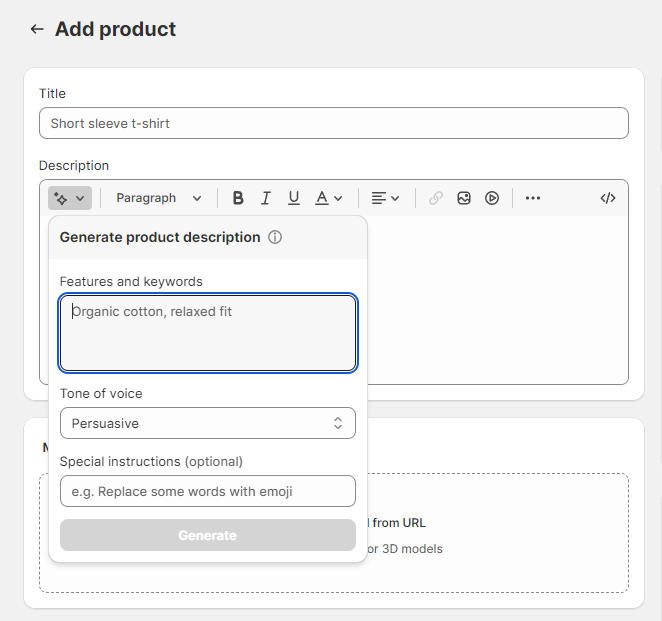
Hocoos, with a score of 7.3, offers an AI website builder that creates websites based on user responses to a few simple questions. It also uses AI to improve the ecommerce experience with personalized product recommendations, visual search capabilities, AI-powered customer service, and more. Additionally, Hocoos has an AI Content Creator that generates written material for pages, blog posts, and articles.
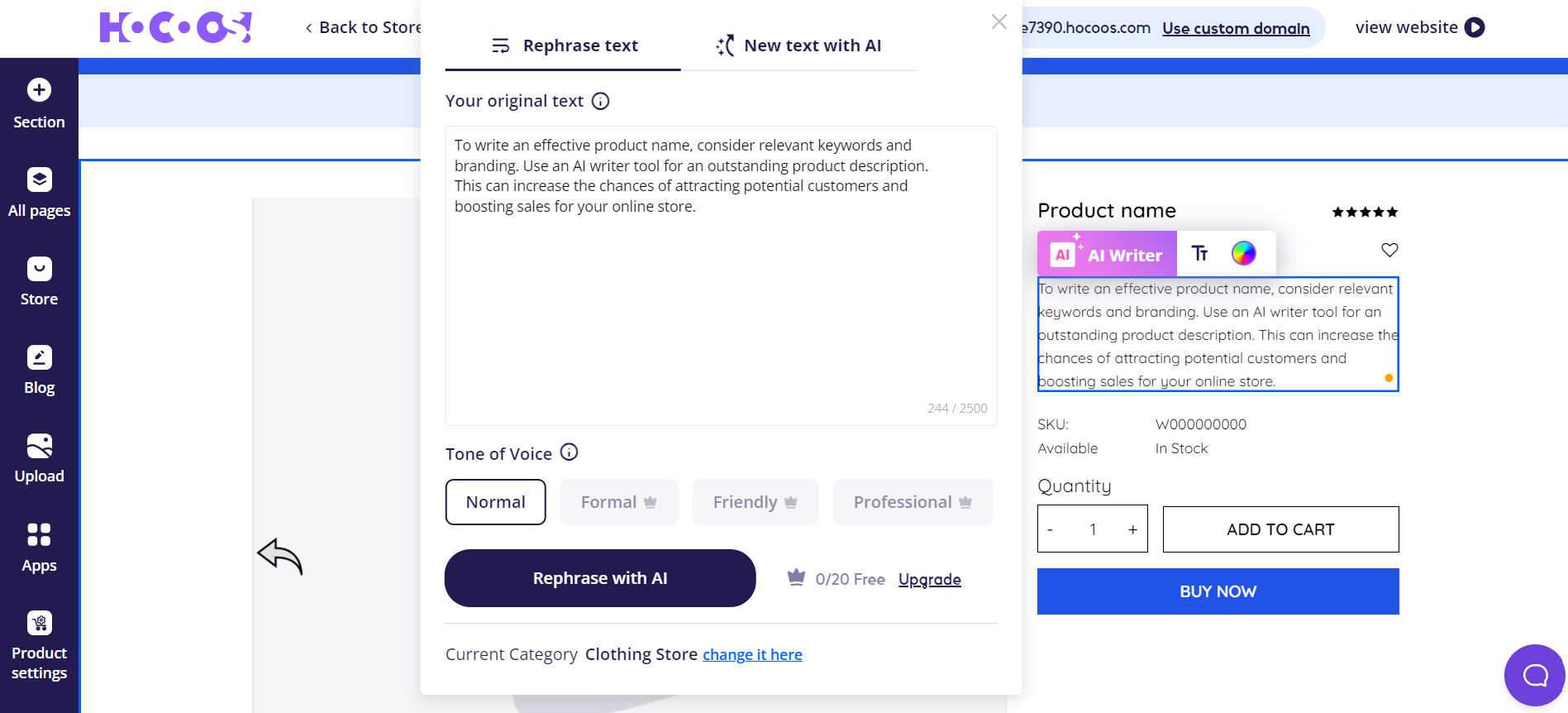
User Management
User ManagementAssesses the platforms’ capabilities in managing user roles, permissions, and accessibility.Score Components:
- Role Customization (40%): Flexibility in creating and defining user roles and
permissions. - Ease of Management (30%): User interface and tools for managing users.
- Access Control (20%): Effectiveness of access control measures for different user
levels. - Scalability (10%): Ability to manage a growing number of users efficiently.
 6.5
6.5
 0.0
0.0
🏆 Winner: Shopify
. Managing your online team with Shopify and Hocoos involves different approaches to website editing access.
-
Shopify enforces staff account limits based on plans, ranging from 2 to 15, with Shopify Plus offering unlimited
accounts. Collaborators with limited access are also an option. - Hocoos does not allow to have multiple users for editing your website.
Shopify User Roles and Access Levels:
| Role | Description | Access Highlights |
|---|---|---|
| Store Owner | Full control over store | Manage products, orders, discounts, payments, apps, settings. Create and manage staff accounts. |
| Staff | Configurable access by owner |
Add/edit products, manage orders, fulfill orders, manage customers, update content. Access level can be customized by the owner. |
| Collaborator | Limited access for external partners | View and manage specific sections like blog or product categories. Cannot access full store settings. |
Hocoos does not provide information about user roles and access levels.
Additional Features

|

|
|
|---|---|---|
|
SSL Certificate |
|
|
|
Custom Domain |
|
|
|
Free Custom Domain Included |
|
|
|
International Domains |
|
|
|
Mobile Responsive |
|
|
|
Page Speed |
|
|
|
Website Builder Mobile App |
|
|
|
Convert a Website To An App |
|
|
|
Website Analytics |
|
|
|
Multilingual Sites |
|
|
|
Multiple Users |
|
|
User Feedback
Shopify’s slightly higher rating on G2 Crowd can be largely attributed to its specialization in ecommerce. Its comprehensive features, ease of use, and robust customer support cater specifically to online businesses, leading to high user satisfaction among those seeking a dedicated ecommerce solution.
Hocoos, on the other hand, does not have any reviews on G2. However, its user-friendly approach, customizable templates, and drag-and-drop functionality make it an appealing choice for individuals and businesses looking to create professional websites without technical expertise. The lack of reviews may be due to its relatively new presence in the market compared to Shopify.
The making of this blog
We followed a clear, step-by-step process to write and research this article.
FAQ
Which platform is better for ecommerce, Shopify or Hocoos?
Can I use Hocoos for creating an informational or business website?
How do Shopify and Hocoos compare in terms of ease of use?
What are the main differences in website editors between Shopify and Hocoos?
Which platform offers better customer support, Shopify or Hocoos?
How do Shopify and Hocoos fare in terms of security?
Are there AI capabilities in Shopify and Hocoos?
Can multiple users manage a website on Shopify and Hocoos?










